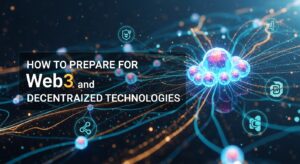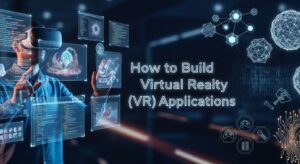Blockchain development represents one of the most transformative and lucrative career paths in modern technology. As we move deeper into the digital economy, the demand for skilled blockchain developers continues to surge, with companies across industries seeking professionals who can build decentralized applications, smart contracts, and innovative Web3 solutions.
Whether you’re a seasoned programmer looking to pivot into blockchain or a complete beginner fascinated by cryptocurrency and decentralized technology, this comprehensive guide will walk you through everything you need to know to start your blockchain development journey successfully.
Understanding Blockchain Development Fundamentals
Before diving into the technical aspects, let’s establish what blockchain development actually entails. At its core, blockchain development involves creating applications that leverage distributed ledger technology to enable secure, transparent, and decentralized systems.
Blockchain developers typically work on three main areas:
- Core Blockchain Development: Building the fundamental blockchain protocols and consensus mechanisms that power entire networks like Bitcoin or Ethereum.
- Blockchain Software Development: Creating decentralized applications (dApps) that run on existing blockchain platforms, including smart contracts and user interfaces.
- Blockchain Integration: Implementing blockchain solutions within existing systems and traditional business processes.
Most newcomers start with blockchain software development, as it offers the most accessible entry point and abundant learning resources.
Essential Programming Languages for Blockchain Development
Solidity: The Smart Contract Standard
Solidity stands as the most crucial language for blockchain development, particularly for Ethereum-based projects. This JavaScript-like language enables developers to create smart contracts that execute automatically when predetermined conditions are met.
Key Solidity concepts include:
- Contract structure and inheritance
- State variables and functions
- Event handling and logging
- Gas optimization techniques
- Security best practices
JavaScript and Web3 Integration
JavaScript remains essential for building user-facing applications that interact with blockchain networks. Libraries like Web3.js and Ethers.js enable seamless integration between traditional web applications and blockchain backends.
Python for Blockchain Analysis
Python’s extensive libraries make it invaluable for blockchain data analysis, protocol development, and building tools for blockchain interaction. Popular frameworks include Web3.py and Brownie for smart contract development.
Core Blockchain Development Tools and Frameworks
Tool Category | Popular Options | Primary Use Case |
Development Environment | Remix, Hardhat, Truffle | Smart contract development and testing |
Blockchain Networks | Ethereum, Polygon, Binance Smart Chain | Deployment platforms |
Testing Frameworks | Ganache, Hardhat Network | Local blockchain simulation |
Wallets | MetaMask, WalletConnect | User authentication and transaction signing |
Setting Up Your Development Environment
Begin your blockchain development journey by establishing a proper development setup:
- Install Node.js and npm for package management
- Set up Hardhat as your primary development framework
- Configure MetaMask for testing transactions
- Create accounts on testnets like Goerli or Sepolia
This foundational setup provides everything needed to start building and testing blockchain applications without spending real cryptocurrency.
Learning Path for Blockchain Development
Phase 1: Master the Fundamentals (Weeks 1-4)
Start by building a solid understanding of blockchain concepts:
- Cryptographic basics: Hash functions, digital signatures, and merkle trees
- Consensus mechanisms: Proof of Work, Proof of Stake, and their implications
- Transaction mechanics: How blockchain transactions work from creation to confirmation
- Network architecture: Nodes, miners, and network participants
Focus on understanding why blockchain technology works before diving into how to build with it.
Phase 2: Programming Foundation (Weeks 5-12)
If you’re new to programming, dedicate time to mastering fundamental concepts:
- Object-oriented programming principles
- Asynchronous programming patterns
- API interaction and JSON handling
- Version control with Git
Experienced programmers can accelerate through this phase while focusing on blockchain-specific paradigms.
Phase 3: Smart Contract Development (Weeks 13-20)
This phase represents the heart of blockchain development for most developers:
Begin with simple contracts like token creation and gradually progress to more complex decentralized finance (DeFi) protocols. Practice writing, testing, and deploying contracts on testnets before attempting mainnet deployment.
Focus heavily on security practices, as smart contract vulnerabilities can lead to significant financial losses. Study common attack vectors like reentrancy attacks, integer overflow, and access control failures.
Hands-On Project Ideas for Skill Development
Beginner Projects
- Simple Token Contract: Create an ERC-20 token with basic transfer functionality. This project teaches contract structure, state management, and event emission.
- Voting DApp: Build a transparent voting system where users can propose and vote on decisions. This introduces concepts like access control and time-based restrictions.
Intermediate Projects
- NFT Marketplace: Develop a platform for minting, buying, and selling non-fungible tokens. This project covers complex state management, payment handling, and metadata storage.
- Decentralized Exchange (DEX): Create a simple automated market maker for token swapping. This advanced project teaches liquidity management and price discovery mechanisms.
Building Your Blockchain Development Portfolio
A strong portfolio demonstrates practical blockchain development skills to potential employers or clients. Include projects that showcase:
- Smart contract security awareness
- Gas optimization techniques
- User experience design for Web3 applications
- Integration with external APIs and oracles
- Testing and deployment automation
Document each project thoroughly, explaining your design decisions and the problems solved. Include live demos on testnets and comprehensive code repositories on GitHub.
Career Opportunities in Blockchain Development
The blockchain development field offers diverse career paths:
- Smart Contract Developer: Specializing in creating secure, efficient smart contracts for various applications.
- DApp Developer: Focusing on full-stack decentralized application development with seamless user experiences.
- Blockchain Architect: Designing large-scale blockchain systems and choosing appropriate technologies for enterprise solutions.
- Security Auditor: Reviewing smart contracts and blockchain systems for vulnerabilities and security flaws.
Current salary ranges for blockchain developers typically exceed traditional software development roles by 20-50%, reflecting the specialized skills required and high demand in the market.
Staying Current in Blockchain Development
Blockchain technology evolves rapidly, making continuous learning essential for blockchain development success. Key strategies include:
- Follow Industry Leaders: Subscribe to newsletters from ConsenSys, Ethereum Foundation, and prominent blockchain developers on Twitter.
- Participate in Communities: Join Discord servers, Reddit communities, and attend local blockchain meetups to stay connected with other developers.
- Contribute to Open Source: Participate in blockchain projects on GitHub to gain experience and build your reputation in the community.
- Attend Conferences: Events like Ethereum DevCon, Consensus, and regional blockchain conferences provide valuable networking and learning opportunities.
Security Best Practices for Blockchain Developers
Security represents the most critical aspect of blockchain development, as code vulnerabilities can result in permanent loss of funds. Essential practices include:
- Comprehensive testing: Write extensive unit tests and integration tests for all contract functions
- Code auditing: Have contracts reviewed by experienced developers or professional auditing firms
- Gradual deployment: Start with small amounts and scale up after proving system reliability
- Emergency controls: Implement pause mechanisms and upgrade patterns for critical systems
Your Path Forward in Blockchain Development
Blockchain development offers unprecedented opportunities for developers willing to master this transformative technology. Success requires dedication to continuous learning, strong security awareness, and practical experience building real-world applications.
Start with the fundamentals, progress through hands-on projects, and gradually tackle more complex challenges. The blockchain ecosystem needs skilled developers who can build secure, user-friendly applications that bring decentralized technology to mainstream adoption.
The journey may seem daunting initially, but with consistent effort and the right learning approach, you can develop the skills needed to thrive in this exciting and rapidly evolving field. Start today, and join the community of developers building the future of decentralized technology.











